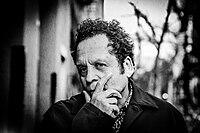Garland Jeffreys
| Garland Jeffreys | |
|---|---|
 |
|
| Background information | |
| Born |
29 June 1943 Brooklyn, New York, United States |
| Genres | Rock and roll, Americana, reggae, blues, soul |
| Occupation(s) | Musician, songwriter, record producer |
| Instruments | Vocals, guitar |
| Years active | 51 |
| Labels | Atlantic Records, A&M Records, Epic, RCA/BMG, Universal, Luna Park Records |
| Website | Official Site |
Garland Jeffreys (born June 29, 1943 in Brooklyn, New York) is an American, singer and songwriter, traversing the musical genres of rock and roll, reggae, blues and soul.
Jeffreys is from Sheepshead Bay, Brooklyn, of African American and Puerto Rican American heritage. He majored in art history at Syracuse University where he met Lou Reed, before The Velvet Underground became active. In 1966, Jeffreys began to play in Manhattan nightclubs including Gerde's Folk City, The Bitter End, Gaslight, Kenny's Castaways and later Reno Sweeney, where he began to explore racially conscious themes in his work, sometimes utilizing blackface masks and a rag doll named Ramon in performance. Jeffreys played guitar on John Cale's 1969 debut solo album Vintage Violence and contributed the song "Fairweather Friend". In 1969 he founded Grinder's Switch with Woodstock-area musicians including pianist Stan Szelest, guitarist Ernie Corallo, and percussionist Sandy Konikoff. Lewis Merenstein, producer of Van Morrison's Astral Weeks, produced this one album before the band dissolved in 1970.
In 1973, he released his first solo album, Garland Jeffreys, on Atlantic Records. Around the same time Atlantic also released a single, "Wild in the Streets," that was not included on the album. Jeffreys wrote the song after hearing about a pre-teen rape and murder in the Bronx. Dr. John played clavinet and helped arrange the song, with backing from guitarist David Spinozza, drummer Rick Marotta, the Brecker Brothers on horns and David Peel on background vocals. After the single's rerelease in 1977, the track received airplay on the progressive FM album-oriented rock stations, and became one of his best-known songs and something of an unofficial anthem for the skate community after the cover by The Circle Jerks was featured in the 1986 film Thrashin'. It has been covered by several musicians, including:
...
Wikipedia
